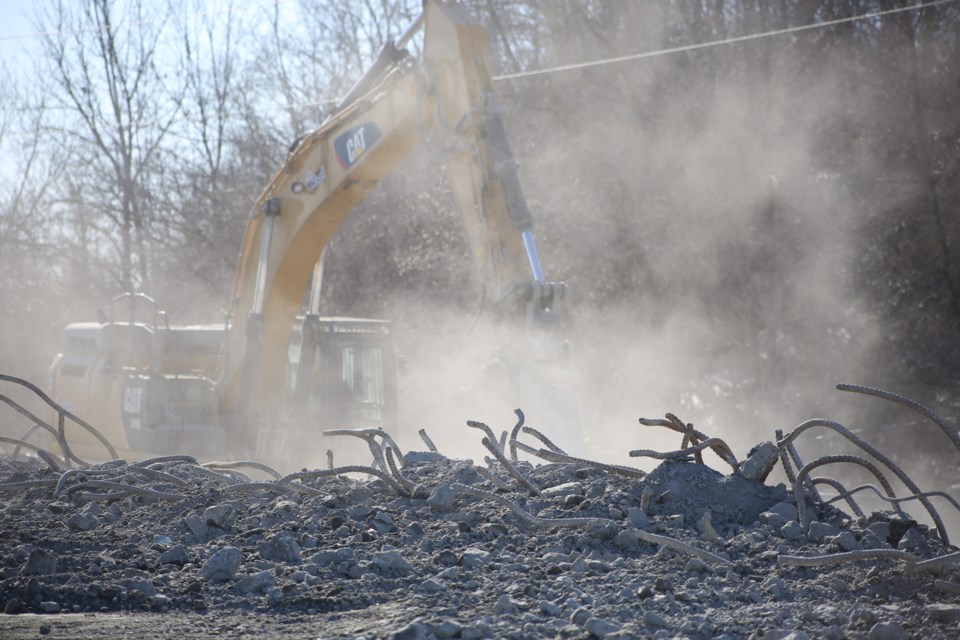With an eye on maintaining the local housing stock, city council unanimously approved a series of demolition control bylaw updates on Thursday, including setting higher fines and new requirements for building tear-downs.
However, council stopped short of answering calls for the creation of vacancy tax on unoccupied residential properties.
“I don’t want to talk about a vacancy tax,” repeatedly declared Mayor Cam Guthrie.
Among the approved changes to the city’s demolition control bylaw is a requirement that people seeking a demolition permit for a home be required to submit building permit plans for a new building on the same site, with a two-year limit put on building.
“By preventing the loss of dwelling units during redevelopment, especially rental units, the City of Guelph can assist in maintaining a steady vacancy rate and existing affordability levels,” city policy planner Lucas Mollame told council, noting site plan approval is no longer needed for developments of 10 units or less under provincial legislation.
Council also upped the fine for demolishing a home without an approved demolition permit to $50,000 per unit destroyed – the maximum amount allowed under provincial legislation – up from $20,000 per unit.
The bylaw, now amended, has been in place since 1988.
Delegate Susan Watson urged council to consider establishing a special tax on vacant or unoccupied residential properties, challenging a hired consultant’s report last fall that hinted such a bylaw could be more trouble than it’s worth.
In that report, the consultant neither recommended nor discouraged the idea of creating a vacancy tax, though it does point to several potential pitfalls, including questioning whether implementing such a tax could have a meaningful impact on local housing supply.
“Housing that is sitting vacant is no longer functional housing stock,” Watson told council on Wednesday, adding the update fails to address the issue of demolition by neglect.
“What developer in their right mind would demolish without a permit or demolish and put pressure on themselves to rebuild with that two-year constrained timeline, when they can just leave a building vacant and let nature take its course,” Watson asked.
Establishing a vacancy tax would give the updated bylaw “teeth,” she suggested.
“If you’re really serious about protecting housing stock in this city, you also need to protect it from demolition by neglect via proactive inspections paid for by the property owner.”
Watson noted that returning 10 unoccupied homes back into the market would save up to $1 million in infrastructure upgrades that would be needed for the same number of units in a previously undeveloped property.
However, the vacancy tax issue wasn’t on the agenda for consideration and Guthrie was quick to voice his disapproval of any discussion about it.
“I ask that your comments are pointed to the issue at-hand, which is the demolition control bylaw,” the mayor told Watson as she took the podium to deliver her delegation. He later reiterated he’s not open to discussing the concept of a vacancy tax after Coun. Phil Allt made reference to the possibility.
Guthrie noted he sees potential benefits in establishing a vacant homes registry, with proactive property standards inspections to prevent demolition by neglect.
“There are homes that, year over year over year, are causing a lot of problems,” said Guthrie. “I believe there is something warranted here around either a registry and/or fines or something that homeowner has to pay for, and not the entire property tax pay for, for their purposeful neglect.”
Coun. Leanne Caron pointed out the updated demolition control bylaw wouldn’t stop someone from gutting a home, while maintaining the main floor assembly, and essentially building new.
“You could do 99.9 per cent (demolition) and it’s still wouldn’t fall under the demolition control bylaw,” she said, noting that’s a situation which has played out locally on a number of occasions. “I think we really need to make sure that behaviour is discontinued.”
The issue of demolition by neglect involving designated heritage properties will be considered when a property standard bylaw update is presented to council for consideration in July. A review of the general property standards bylaw is currently slated for 2027.
In the years between 2002 and 2022, there were 337 legally demolished residences throughout the city, staff note in a report to council. That’s an average of 16 units per year.
“The majority of these demolitions have been single detached dwellings, however most of those demolitions were replaced with new residential buildings,” states a discussion paper, which is included on the council agenda. “Overall, demolitions of single-detached homes are resulting in a net increase of housing supply.”
To illustrate that point, the paper notes there were 20 approved residential demolitions in 2022 which allowed the creation of 240 new units, largely in the form of apartment buildings.




